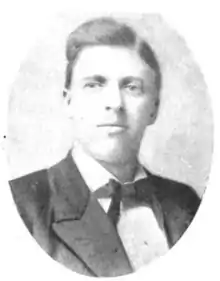Frederick Lundin
Frederick Lundin (May 18, 1868 – August 20, 1947) was a U.S. Representative from Illinois and a Republican Party ward boss in Chicago. He played an instrumental role in the successful mayoral elections of William Hale Thompson and the creation of Thompson's patronage system. He also built up the organized syndicate later taken over by Al Capone in 1922. [1] [2] [3] [4]
Frederick Lundin | |
|---|---|
 | |
| Member of the U.S. House of Representatives from Illinois's 7th district | |
| In office March 4, 1909 – March 3, 1911 | |
| Preceded by | Philip Knopf |
| Succeeded by | Frank Buchanan |
| Member of the Illinois Senate | |
| In office 1894-1898 | |
| Personal details | |
| Born | May 18, 1868 Hästholmen, Ödeshög Municipality, Sweden |
| Died | August 20, 1947 (aged 79) Beverly Hills, California |
| Political party | Republican |
Background
Lundin was born in the parish of Västra Tollstad, Hästholmen, Ödeshög Municipality, Östergötland County, Sweden. He immigrated with his parents when he was a child to the United States and settled in Chicago, Illinois in 1880. After completing his academic studies, he served as president of Lundin & Co. manufacturer of Lundin's Juniper Ade, which was made from Juniper berry extract. [5] [6]
Career
Lundin served as a member of the Illinois State Senate from 1894–1898. He was later selected to serve as an alternate delegate to the Republican National Convention from Illinois in 1904. In 1908 Lundin was elected as a Republican Congressman to the 61st United States Congress from Illinois' 7th congressional district in Near North Side, Chicago. He was a one-term congressman from March 4, 1909 until March 3, 1911 and was defeated for reelection in 1910. He resumed manufacturing interests and became involved as a Republican party ward boss in Chicago. Richard Norton Smith describes Lundin as:
A Lorimer protege esteemed for his organizational gifts and excused for his eccentricities ... For archaeologists of political roguery, he is the fossil evidence that democracy and flim-flaming go hand in hand. A man of many poses, Lundin referred to himself with contrived modesty as "the Poor Swede." Before entering politics, he had thrived as a patent medicine salesman peddling Juniper Ade, an all-purpose tonic concocted from juniper berries.
— Richard Norton Smith[7]
In exchange for his supporters voting as he told them, Lundin arranged jobs mainly in the municipal sector. Lundin was instrumental in the election of William Hale Thompson as mayor in 1915 and succeeded in getting Thompson to appoint over 30,000 supporters to the city payroll in a form of political graft as all were required to kick back part of their pay to Lundin's organization. In 1922, Lundin was indicted on a charge of embezzling tax money. Although he was acquitted, this was the beginning of the end of his career as a political boss. [8]
Lundin died in Beverly Hills, California on August 20, 1947 and was interred in Forest Home Cemetery, Forest Park, Illinois.
See also
Bibliography
- United States Congress. "Frederick Lundin (id: L000515)". Biographical Directory of the United States Congress.
References
- "Immigrant Frederick Lundin (1868–1947)". The Electronic Encyclopedia of Chicago. Retrieved October 1, 2020.
- "Swedish Candidate, Frederick Lundin to Congress". Svenska Amerikanaren -- October 22, 1908. Retrieved October 1, 2020.
- Gustav Skogens (2011). "Svensk styrde Chicago före Al Capone". Allt om Historia (1/2011): 46–49.
- ""Chicagoboss från Västra Tollstad blev miljonär på enbärsdricka" (PDF). hembygdsbok. Retrieved October 1, 2020.
- "Lundin, Frederick (1868-1947)". Biographic Directory of the United States Congress. Retrieved October 1, 2020.
- "Lundin's Juniper-Ade". worthpoint.com. Retrieved October 1, 2020.
- The Colonel. Richard Norton Smith. Pg 183. 1997. Houghton Mifflin
- "The Most Corrupt Public Official In Illinois History: William Hale Thompson". NBCUniversal Media, LLC. Retrieved October 1, 2020.
| U.S. House of Representatives | ||
|---|---|---|
| Preceded by Philip Knopf |
Member of the U.S. House of Representatives from Illinois's 7th congressional district 1909-1911 |
Succeeded by Frank Buchanan |
![]() This article incorporates public domain material from the Biographical Directory of the United States Congress website http://bioguide.congress.gov.
This article incorporates public domain material from the Biographical Directory of the United States Congress website http://bioguide.congress.gov.